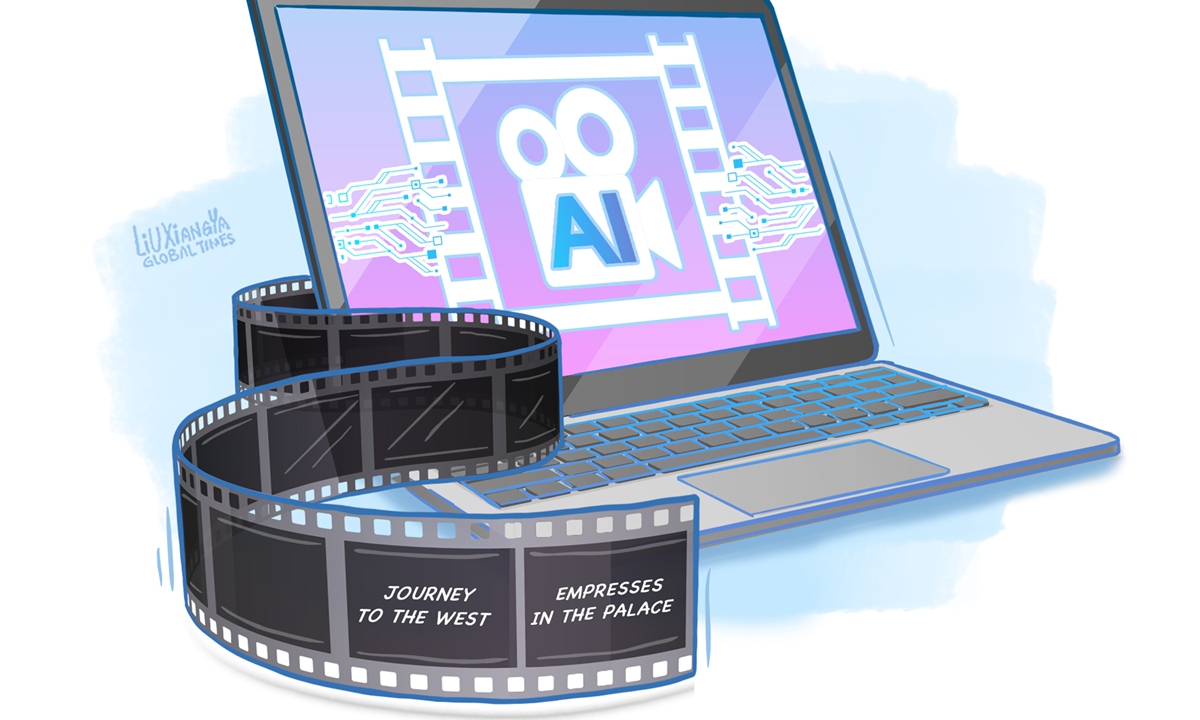
Illustration: Liu Xiangya/GT
In response to the recent increasing prevalence of AI-modified videos parodying classic Chinese TV series,
mk China's National Radio and Television Administration issued a notice on Sunday that said these videos blur the line between real and fake and distort classic works.
The notice cited some examples of AI-altered videos, saying that these videos, created purely to attract attention, recklessly disrespect iconic intellectual properties, undermine traditional cultural values, contradict the original works' core spirit, and may constitute copyright infringement.
The notice also outlines specific management requirements to address these issues.
The bitter power struggle for the imperial throne in the Chinese TV series
Empresses in the Palacewas turned into a gunfight. Lin Daiyu, one of the protagonists from the drama
Dream of the Red Chambercan be seen boxing while the Buddhist monk Tang Sanzang from
Journey to the Westabsurdly "agrees" to a girl's proposal.
Recently, some Chinese social media platforms have seen a surge in AI-altered short videos adapted from classic Chinese TV dramas. These dramas are widely cherished for their artistic value.
Iconic scenes from these TV series have been transformed into absurd visuals through the use of AI technology.
The administration requested in the notice that short video platforms conduct thorough reviews and remove AI-modified film and TV drama videos. The platforms are urged to implement strict controls on the approval and monitoring of related technological products used and shared on their platforms as well as provide clear labels for AI-generated content.
AI-modified clips of classic TV dramas not only infringe on copyrights, but also pose the risk of eroding these shows' cultural significance and distorting the emotional connections of viewers who grew up with these series.
Ma Guohua, a Beijing-based lawyer, told the Global Times on Sunday that these AI-altered videos potentially violate copyright protections.
"I've heard about this issue. Modifying the plot of a TV series without the original creator's consent may constitute a violation of their copyright," said Ma.
"Moreover, some of these changes are absurdly far-fetched, distorting the original intent of the work," the expert noted.
Balancing technological innovation with respect for the artistic and cultural heritage of dramas is crucial to mitigate negative impacts on classic works.
Classic TV series are deeply rooted in cultural and historical context. Altering their narratives risks distorting the original themes, values, and messages, potentially leading to the erosion of their cultural significance.
The characters and values portrayed in these TV dramas are often deeply intertwined with the prevailing beliefs, social dynamics, and collective consciousness of their respective eras. For example,
Journey to the Westnot only celebrates traditional Chinese culture but also inspires and motivates audiences with the Monkey King's righteous, courageous, and defiant spirit.
In a similar vein, the intensely strategic palace intrigue of
Empresses in the Palace, steeped in schemes and power plays, serves as a mirror reflecting modern society's critical view of workplace culture that overly emphasizes "competition" and "elimination."
These videos may present characters and events in a satirical or exaggerated light, potentially misleading audiences about the original work's intent. For instance,
Journey to the West's focus on courage and morality might be undermined by comedic or absurd alterations.
You Xiaoyi, a 22-year-old who works in industrial design, told the Global Times on Sunday that AI has made it difficult for viewers to distinguish between original works and modified versions.
"The use of AI has lowered, or even changed, the technical barriers for creators in fields like video editing, making it difficult to distinguish original works from altered versions, while some of the recent spoofing of classic TV series is too absurd," said You.
Frequent exposure to AI-modified versions might lead younger audiences or international viewers unfamiliar with the originals to accept these distortions as authentic representations of Chinese culture and heritage.
For viewers who grew up with these series, AI-modified versions can alter their emotional connection and cherished memories.
Repeated exposure to these distorted depictions risks overwriting personal recollections of the original content.
The parodying of classic dramas raises issues about the balance between innovation and preserving cultural legacy.
It's essential to respect classic works while exploring new forms of expression that carry on the values and cultural significance of these classic works.
The author is a reporter with the Global Times. life@globaltimes.com.cn

